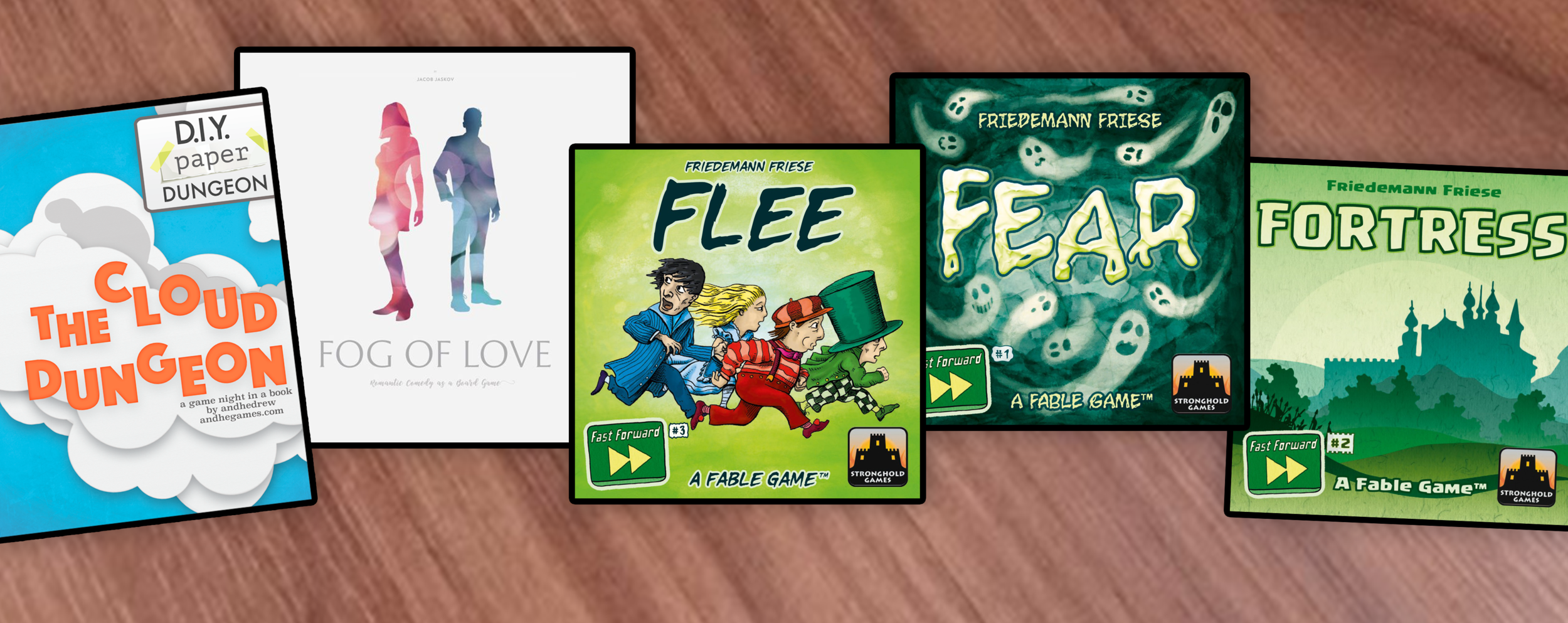Fast Forward: Fortune
Designer: Friedemann Friese
Players: 3-5
Ages: 10+
Time: 5ish minutes per hand, about 75-90 minutes when playing through the entire deck
Fortune is the newest entry in the Fast Forward series from Stronghold Games.
In Fortune, like the other games in the Fast Forward series, the rules are broken into very small chunks so the players can more easily learn as they play through the deck their first time. The complete lack of a ponderous tome of rules to be read before starting the game is a huge advantage - play begins by reading the starting rules on the first card on top of the deck and following the instructions. Players don’t even know what maximum hand size is or how to win until they are eleven cards into the deck. As players draw cards new rules surface and are incorporated into the game, either adding to the game or replacing previous rules.
Card 1 starts the game, and the next rules show up after several cards have been drawn by all the players, just as they start wondering what they are trying to accomplish.
On their turn, players each draw a card from either the deck, or the discard pool. Then, if they have more than three cards, they either discard a card, or if they have a card with a special action they want to use play the action card in front of them. Once six cards are discarded the final round is triggered, and scoring happens quickly thereafter. However in Fortune the goals and scoring can change; in one hand players may be playing a variant where they compete to get the highest score while in another they may be trying to get the lowest value or gather a specific kind of card for a really huge score.
Fortune has all kinds of cards. Cards with numbers, cards with special actions, rules, cards, and cards that change the way a player’s cards are scored.
Play changes as rules change and cards are removed from the top of the deck between rounds, so what worked last round may not work again. New cards add a variety of special abilities that either have an immediate impact when played during the game or may remain hidden in their hands until revealed during scoring. One set of cards may provide a score of over 100, but if you change just one card your hand may have a negative value. That kind of swing may be a good or a bad thing, if the way cards are scored changes when a new rule is flipped.
Once the deck has been played through it can be resorted by number, to provide a fresh discovery experience to new players, or the base rules can be set aside while all the other cards are just shuffled together and played as a complete game with some rules changing over time. For more intense competition players can track wins over multiple games, with a natural stopping point being the depletion of the deck.
Fortune, of all the Fast Forward games, feels like there is a lot that could be done to expand the game play. More goals and rules, more cards with special powers, and greater use of the existing iconography. It is easy to imagine another Fortune game of a similar level of complexity that could be shuffled into this deck to provide a richer game experience.
The particular genius of the Fast Forward Series is how approachable it is. Though die-hard gamers are likely to find Fortune a little lite, especially at the start of the deck, it really is an amazing game for a public library or even in classrooms where quick games are needed or basic math skills are being reinforced. The changing rules help familiarize players with dealing with a changing environment while the sense of discovery keeps Fortune interesting over time.
Article by Donald Dennis
Games in Schools and Libraries is produced in association with Inverse Genius and the Georgetown County Library System.
Games in Schools and Libraries Group on Facebook
Games in Schools and Libraries Guild at Board Game Geek
Email us: schoolsandlibraries@gmail.com




